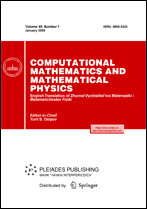|
This article is cited in 9 scientific papers (total in 9 papers)
Examples of parametrization of the Cauchy problem for systems of ordinary differential equations with limiting singular points
E. B. Kuznetsov, S. S. Leonov
Moscow Aviation Institute, Moscow, Russia
Abstract:
The paper presents an application of the method, developed by the authors, in which the solution is continued with respect to a modified best argument, measured along the integral curve in a nearly tangent direction, and the properties of the argument are close to the best. The problems of irreversible deformation, connected with the calculation of the creep and long-term strength of metal structures, are chosen for the test. The creep process is modeled by initial problems for systems of ordinary differential equations with several limiting singular points. Two problems of uniaxial stretching of samples from steel 45 and titanium alloy 3V are considered. The solutions of these problems by explicit methods using a modified argument for the continuation of the solution are compared with the results of application of the best parametrization and implicit Runge–Kutta methods, as well as with analytical solutions.
Key words:
solution continuation with respect to a parameter, best parametrization, limiting singular point, system of ordinary differential equations, initial problem, creep, fracture, damage parameter.
Received: 15.05.2017
Revised: 24.07.2017
Citation:
E. B. Kuznetsov, S. S. Leonov, “Examples of parametrization of the Cauchy problem for systems of ordinary differential equations with limiting singular points”, Zh. Vychisl. Mat. Mat. Fiz., 58:6 (2018), 914–933; Comput. Math. Math. Phys., 58:6 (2018), 881–897
Linking options:
https://www.mathnet.ru/eng/zvmmf10704 https://www.mathnet.ru/eng/zvmmf/v58/i6/p914
|


| Statistics & downloads: |
| Abstract page: | 293 | | References: | 40 |
|





 Contact us:
Contact us: Terms of Use
Terms of Use
 Registration to the website
Registration to the website Logotypes
Logotypes








 Citation in format
Citation in format 
